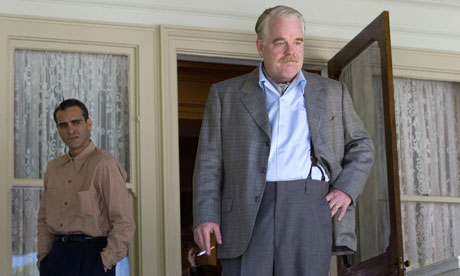
Paul Thomas Anderson is the critics' director, or one of them – and as if to prove it, at the press show of his latest epic, The Master, there were agonised male groans when it was announced that, rather than watching 70mm film, we would have to make do with digital (insoluble technical problem, apparently). Not that many of us left our seats, even though some had already seen the film at Venice, or wherever. This is how much the critics love Anderson: most were ready and willing to submerge themselves in his film's murky depths again, digital or not.
Will the public want to see The Master twice? I doubt it. A few may not even be able to endure it once, all the way through. It is a long, inscrutable film, and one deeply in love with its own processes. Watching it is like being stuck in a one-way system in a strange town; with every loop, it grows more familiar and yet more confusing. Anderson seems not to care that his script is oblique to the point of folly, preferring instead to rely on the way it looks (his shots, so beautifully framed, make you think of the great American painters, of Edward Hopper, Grant Wood, even Richard Diebenkorn) and, more heavily, on its central performances. He wouldn't be the first to go this route – mass Oscar nominations, as Anderson's last movie, There Will Be Blood, received, often send film-makers bonkers when next they go to work. But for this viewer, The Master was a huge disappointment. After an hour, I was baffled. After two, I was bored stiff.
In interviews, Anderson has denied that The Master is about Scientology. In the disorienting years following the second world war, he insists, all sorts of barmy creeds and cults were able to claim their recruits; his film might depict any one of them. Nevertheless, The Cause seems a lot like Scientology to me. Its Hubbard-like leader, Lancaster Dodd (Philip Seymour Hoffman), aka the Master, is obsessed with human potential – "Do your past failures bother you?" his acolytes ask, as they accost folk in the street – and he is apt to talk of what happened "trillions" of years ago in the same manner that most people discuss what happened yesterday in Sainsbury's. He also – again, big L Ron springs energetically to mind – encourages his followers to "regress", the better that they might explore their past lives. He, it turns out, was something big during the Franco-Prussian war.
Into his orbit comes Freddie Quell (Joaquin Phoenix) – the clue, we note, is in the surname – who has been discharged from the US navy with psychological problems. Freddie is an alcoholic, addicted to hooch he makes from paint stripper and cough medicine, and he has violent tendencies. What else is he going to do but follow Lancaster and his creepy wife, Peggy (Amy Adams)? He has no job, no people, no real desires. For his part, Dodd makes him a special project. Thanks to his ego, which has the proportions and toxicity of a mushroom cloud, he isn't built to resist a challenge. So, they hook up, and they travel, and should anyone question Lancaster, Freddie deals with them the old-fashioned way, throwing a punch in their direction rather than, say, the hefty first volume of the Master's, erm, masterwork.
The first half hour of the film, in which we glimpse Freddie in the years before he collides with Dodd, is magisterial, as mesmerising and as singular even as the opening of There Will Be Blood. Freddie on a beach, pretending to screw a woman he and other sailors have fashioned from sand; Freddie working as a department store photographer, shooting those for whom the American dream might just become a reality; Freddie hacking monstrous cabbages from their brittle stalks. There is a wonderful scene in New York, when Lancaster is revealed as a fraud in the house of a rich recruit – and Freddie, by way of a portent, hurls a tomato at the accuser's chest.
But once we've established that Lancaster is a phoney and Freddie a fuck-up, the film seems not to know where to go next. Over and over, Anderson has us listen to Dodd's silly, tautologous teachings. Over and over, we watch Freddie being "programmed" (Dodd makes him walk back and forth across a room with his eyes shut, who knows why). But what does all this achieve? Nothing. Neither one of them changes. It's not that I expected a reckoning; the Scientologists, after all, are a good deal more powerful in 2012 than they were in 1950. But no film, surely, should end exactly where it began.
And what of these two actors, who will no doubt soon be slugging it out for an Oscar? Phoenix's face has more shadows than Vienna at midnight; usually, I'd rather watch him than almost any other actor. Here, though, he's trapped in a set of tics and winces. He does rage brilliantly, rallying every part of his body, even the sad hump of his back, for the fight. But after a while this fails to move you, its monotony pounding in your head.
Seymour Hoffman, meanwhile, turns the charisma up to high, in the hope, I guess, of emphasising the showbusiness aspect to cult leadership. The only trouble is, his flashiness maroons him. You feel, always, that you are watching a turn. For sure, this reinforces your scepticism; even when he's being kind, you look at him with narrowed eyes. But it makes you doubt the film, too. It's so extravagantly showy. What is it that we're being sold, here? A movie that yearns to be great, but really isn't. A movie that is so long-winded, it could graze the hem of the irredeemably prolix L Ron Hubbard himself.

